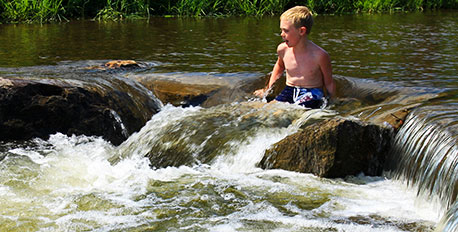The following first appeared in, York Dispatch.
Investments from the National Fish and Wildlife Foundation (NFWF) and matching contributions offer key support for York County's efforts to reduce polluted runoff and manage stormwater.
With $200,000 in NFWF funds and matching money, Wrightsville Borough will reduce polluted runoff by adding a large stormwater retention basin within Riverfront Park on the Lower Susquehanna.
"What makes NFWF funding so valuable is that it can be used for matching funds and is easily matchable," says Ben Craddock, president of Lancaster Civil Engineering Company, that worked on the Wrightsville Borough project. "We didn't find anyone who didn't want to match with NFWF."
With a NFWF grant of over $200,000 and matching funds, York County's plan to create a stormwater authority will take an important step forward, advancing to development of an actual business plan. The authority would implement cost-effective regional stormwater solutions that address problems like nuisance flooding and local stream pollution. It can also produce more fishing opportunities and cleaner sources of drinking water.
Felicia Dell, director of the York County Planning Commission, said, "Without NFWF, we wouldn't be able to advance the idea of a stormwater authority past the feasibility stage to developing an actual business plan."
Financial and technical assistance from NFWF supports cost-effective and creative solutions that clean and restore polluted rivers and streams in Pennsylvania and the Bay states. Investments like these come through NFWF's Chesapeake Bay Stewardship Fund.
It was recently announced that NFWF will award 44 grants from the Stewardship Fund for 2017, to Bay states totaling $12.6 million. The investments will be matched by almost $18 million in contributions, bringing the total on-the-ground impact to about $30 million.
In 2016, 39 NFWF grants totaled $10 million, to leverage $13 million in contributions, bringing the total on-the-ground impact to about $23 million.
Projects in Pennsylvania that benefit from NFWF grants are too numerous to list. Here are a few more:
- In Lancaster County, American Rivers, will remove Krady Mill Dam. It is a deteriorating safety hazard and the first barrier on Chiques Creek, a tributary of the Susquehanna River. Removal will also benefit migratory and resident fish.
- When a former factory site in Carlisle is redeveloped into commercial and residential properties, a hotel, and a restaurant, the borough's Urban Stormwater Park will collect and filter runoff to protect the vulnerable LeTort Spring Run from pollution.
- More than 600 feet of eroded stream channel was stabilized and restored on a tributary of Paxton Creek, in a watershed that drains much of the greater Harrisburg metropolitan area.
- In Potter County, Trout Unlimited will reduce sediment on Kettle Creek and open up 1.6 miles of coldwater habitat to eastern brook trout.
- The Adams County Conservation District received NFWF funding in the past to monitor various watersheds and develop 75 plans for reducing runoff.
- In Franklin County, the Conococheague Creek Riparian Buffer Campaign increased tree plantings along rivers and streams in rural and urban areas and encouraged conversion of turf to trees on residential and commercial properties.
As Pennsylvania considers yet another budget that does not adequately fund pollution reduction efforts, federal partnerships like those with NFWF and the Chesapeake Bay Program are as important as ever.
The spending bill approved by federal House Appropriations Committee cuts support for the Bay Program from $73 million to $60 million. Hopefully that funding will be restored. Pennsylvania cannot afford to fall further behind in meeting its clean water commitments.
Roughly 19,000 miles of Commonwealth rivers and streams are harmed by pollution. NFWF grants help clean them up, improve farm economies, and protect human health and welfare.




